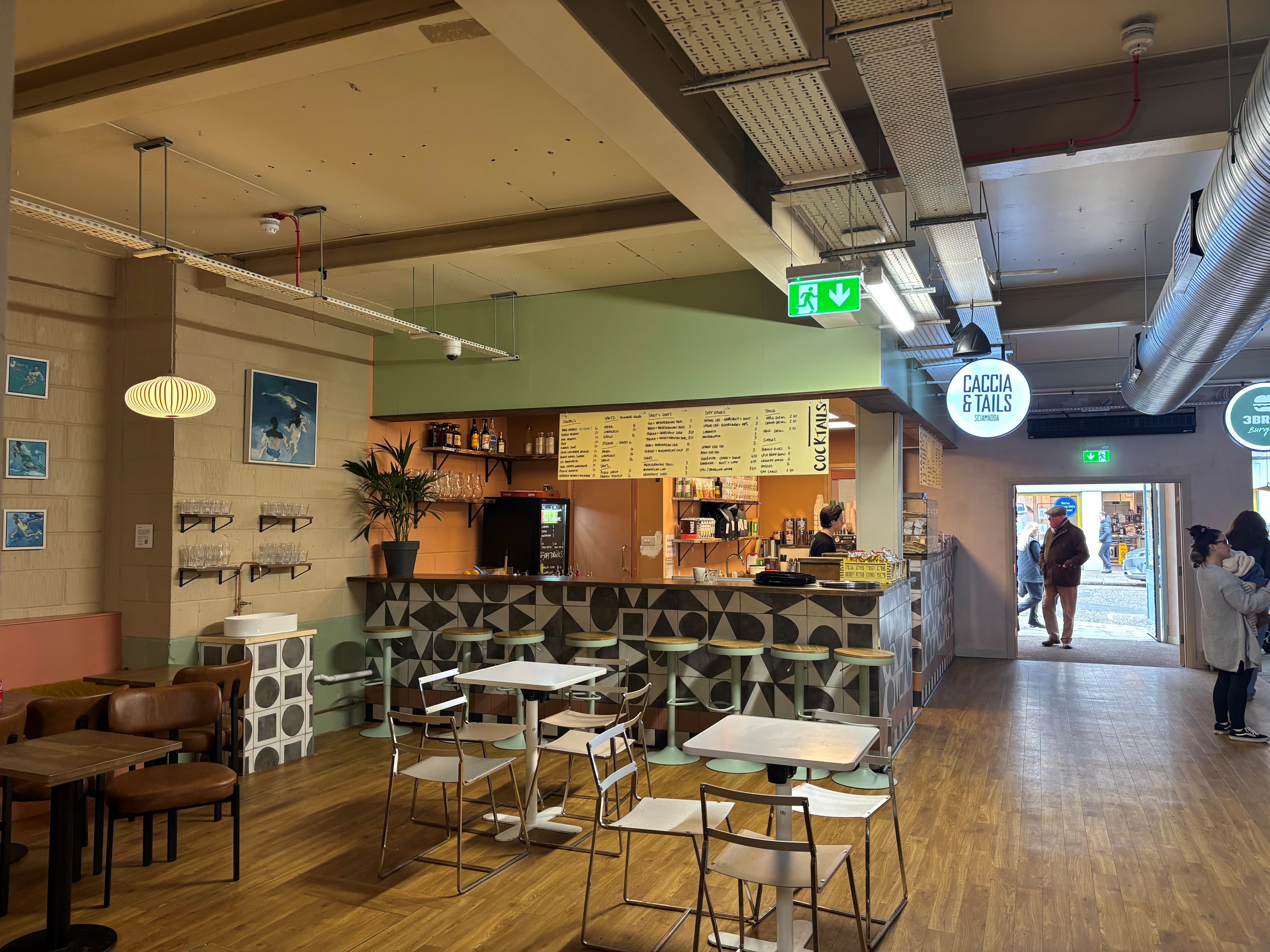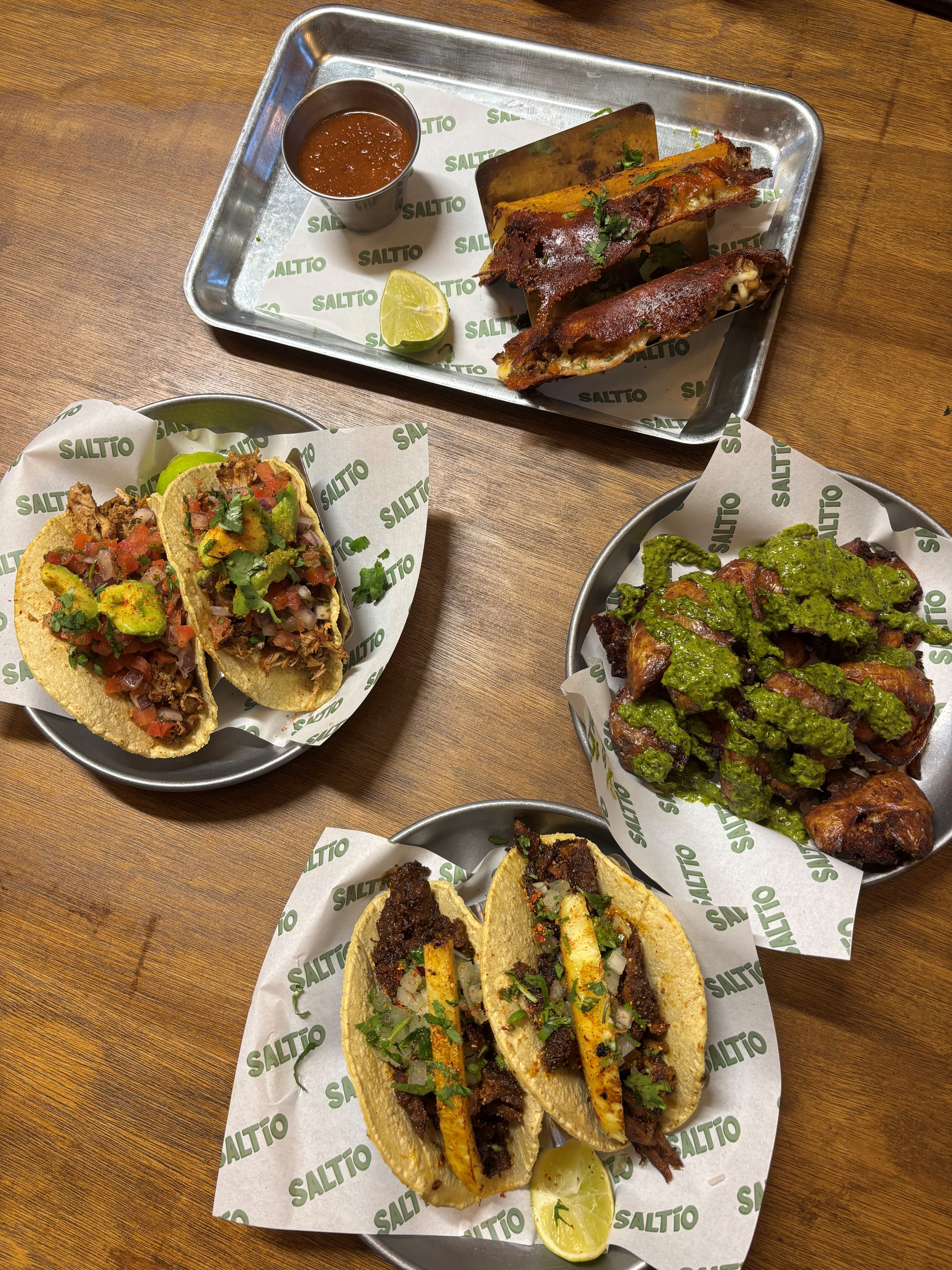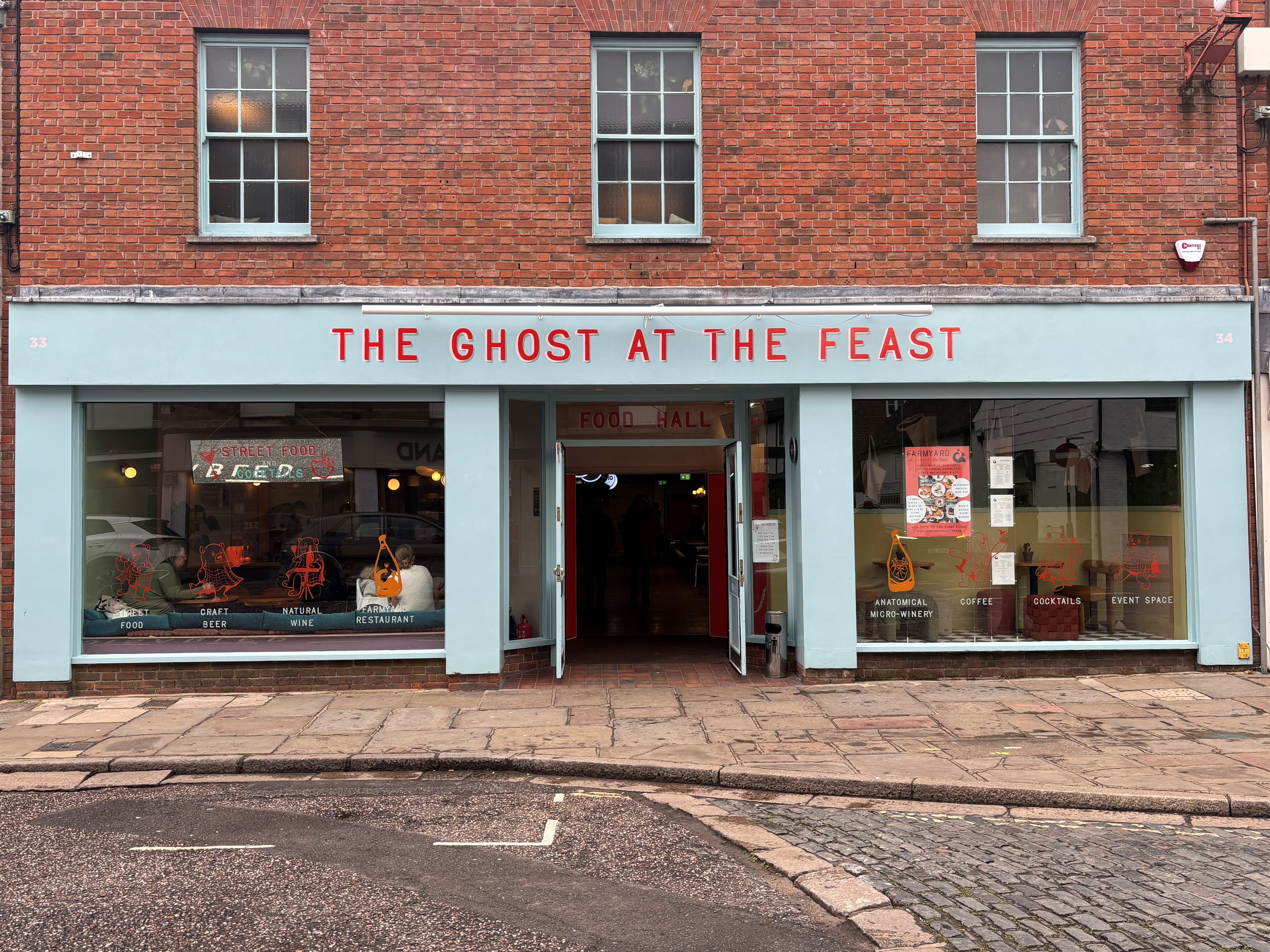Former journalists Ben and Kate O’Norum took a leap of faith when they quit their jobs in London to follow their dreams of becoming restaurateurs. Moving to St Leonards, a small town and seaside resort in the borough of Hastings in East Sussex, the former Evening Standard and ITN employees opened their bar and restaurant Farmyard and later seafood restaurant Boatyard before going on to launch food hall Heist in a former bank in the town. The pair have recently just opened their second food hall venture The Ghost At The Feast in Chichester, which is also home to a second standalone Farmyard restaurant.
You opened The Ghost At The Feast at the end of last year. Tell us about it
It’s a venue that has seven street food kitchens (3 Bros Burgers, Chao Ban, Gio Japanese, Just by Jameson, Natty’s Jerk, Phoenix Dining, and Saltio) as well as focaccia, pastries, coffee and cocktail bar Caccia & Tails, a beer bar run by Fauna brewery and Farmyard restaurant that we run ourselves. There’s also a winery on the site (Anatomical Wines) run by my wife Kate. It’s split into two areas – the ground floor, which has the street food traders and upstairs, which houses the bar and Farmyard. It’s nice to have two different atmospheres. In very simplistic terms, the ground floor is quite buzzy in the day and upstairs becomes more popular in the evening.
You mentioned a winery
Yes. There’s a small winery at the back of the site. Kate is doing a masters in wine making at Plumpton College and we have our first batch of wines on the go. The harvest came round before the winery did, so we were pressing the grapes in our back garden before putting them into tanks. The grapes are from Hertfordshire, but we hope to get some more local grapes next year. We use Chardonnay and Pinot Noir to make three wines - a chardonnay, a skin contact chardonnay, and a pinot noir. Some bottles are undergoing secondary fermentation so we will have a sparkling wine as well.
The Ghost At The Feast is an interesting name…
It’s a reference to Macbeth (Macbeth sees a ghost at a feast which serves a symbol of his guilt for the murders of Duncan and Banquo), but we use it slightly incorrectly. The ghost is the unpleasant thing that people don’t want to acknowledge, and we’ve taken the view that that could be a reference to the restaurant industry and that it’s a bit broken. We did look at opening a restaurant in Chichester, but we couldn’t see how we could make it work financially with the rents and rates and so came to this food hall model as the next step. The working title for ages was just Feast but we thought that was a bit boring.

What is the model?
The Chichester site is based on our first food hall called Heist that we opened in St Leonards. We liked the idea of creating a little collective space. We enjoy having ideas but don’t have a lot of money or backing and this is a way to do that without those means. The financial model is that many businesses are chipping in so that the rents and rates and overheads are divided. Traders pay a combination of rent and commission.
How did you decide on which traders to have in Chichester?
The key is curation. It’s not a case of if you can pay, you’re in; we try to work hard on getting it right. We went to a lot of local events that had a food element and looked at the different markets out there and sought out people on social media and tried their food. We tried to keep it within a small radius – everyone here is from between Portsmouth and Brighton. For a trader, there are two different sides to it. It’s a relatively simple set up compared to opening their own site because a lot of things are taken care of, but on the other hand we do enforce quite strict opening hours so they do have quite a long day and we are open seven days a week, which a lot of smaller businesses might choose not to do. Some smaller traders are put off by that but it’s something that is essential to the model, otherwise it becomes very bitty, and you don’t know who’s open when.

How did you get into the restaurant industry?
Kate and I left London on a bit of a whim. We sold our flat and got a house in St Leonards and opened a little wine bar there called Farmyard in 2018. Kate had worked in wine bars and restaurants, including Albertine in Shepherd’s Bush, but was in journalism as well, and I had done some street food, but I wouldn’t call myself a chef. I was in the kitchen at the beginning and Kate was front of house and we just did cheese and charcuterie and snacks, but people would ask for a whole meal, and so we added dishes such as steak and a catch of the day to the menu and, before we knew it, we had a full offer. We were open less than a year before we hired a proper chef, called Nick Leonard, and that was really the turning point.
What was it like opening in St Leonards?
Back then it was quite different to how it is now. All the DFLs (Down from Londons) have really settled into St Leonards and brought with them quite a lot of nice places to drink and eat. Back then there were some very nice places, but it wasn’t that sort of Londoney vibe there is now. At first, we stood out a little bit, but we were made to feel very welcome.
You grew from there…
We then opened a seafood café called Boatyard in the Hastings Contemporary gallery. One of the directors had become a regular at Farmyard and was looking for someone to run the café and do something more interesting. We got it in the tender process and opened Boatyard in January 2020 and the rest in history. We opened for six weeks before Covid hit, and the gallery took a very long time to reopen. We did eventually get back open but didn’t stay open for that much longer because the plans for the gallery had been changed by Covid. It was going to become free entry but in the end it didn’t and having a restaurant in a place people must pay admission didn’t work. At the same time we were working with a friend on opening a food hall called Heist, which was on the site of an old bank, and decided to move Boatyard into it.
Do traders stay long with you?
Yes, people do stay for the long term. There was a Japanese concept at Heist (Arigato) that has now opened across the road and has been a nice progression for them but in general we see it more as a long-term thing than constantly changing traders. We are not an incubator space particularly. There are seven traders in Chichester and only four at Heist so with that bigger number we may allow one or two to change more quickly where it feels natural, but the idea is that they come in and grow with the space.
What have been your learning with Chichester so far?
Getting the model right is vital. It’s early days to say whether the model is right yet but when we opened, we weren’t charging enough rent. It was at a time when costs were rapidly going up so maybe half of that was our fault from the start and half of it was circumstance, but we quickly realised we needed to change the pricing structure and have those awkward conversations with people.


